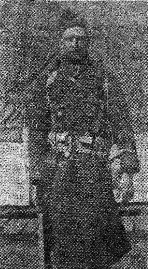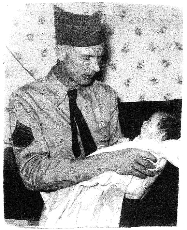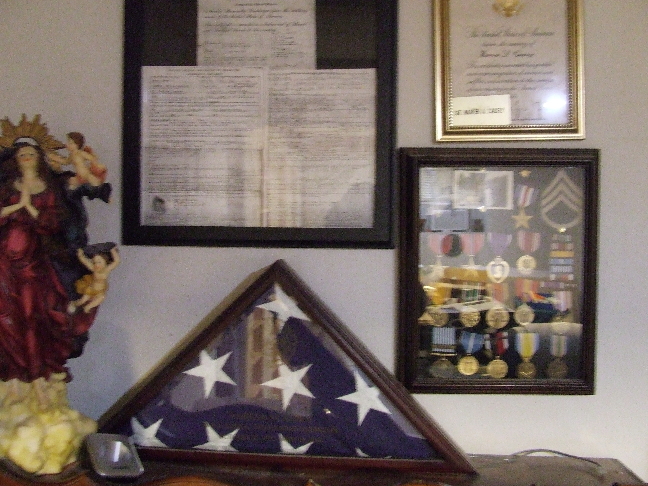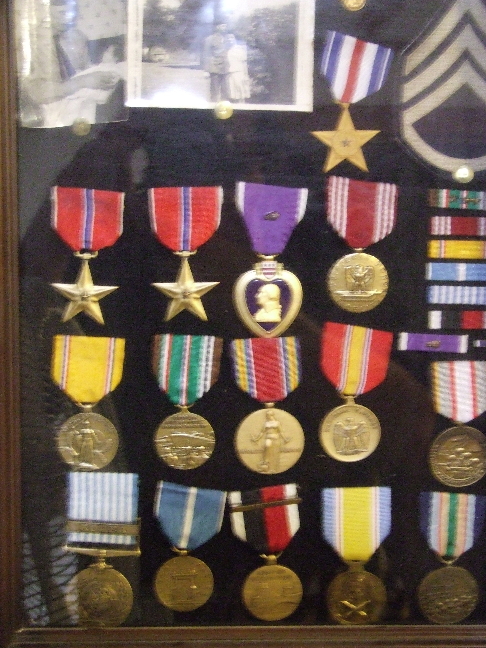



Company A, 20th Engineer Regiment
Causey fought in almost every campaign of the 20th Engineers. He was wounded twice, first in Corsica on 12 October 1943 (in a little known operation in which the 20th Engineers participated), and again in the Ardennes. His decorations included the Purple Heart with oak leaf cluster, two Bronze Stars, and a Silver Star. Causey was sent home because of his wounds in the Ardennes.
Warren Causey's son, Steve Causey, provides this memory from Warren's landing on D-Day:
The following is an account of my father's landing on Omaha Beach, as part of the first wave that landed on Omaha. This information is as he recalled it some years later and it is so vivid, that I have no problems recalling this account.
He was one of the first soldiers on the beach. It was the 20th Combat Engineers' duty to clear the beach of "Obstacles," so they landed before the Infantry.
A little background information is necessary to clarify why my father was the only soldier from Company A to make it onto Omaha beach in the first landing. My father was a good swimmer; he used to swim the Tennessee River before it was flooded and became what is now know as Kentucky lake in the early 1940s, near Dover, Tennessee. My father's swimming ability would save his life as he landed on Omaha beach.
My father joined the army in 1939 because of the depression. Jobs were hard to come by and he tried his hand at fishing, but there was little money in that, about one dollar per day.
My father was on a landing craft that had a half track vehicle on it, with a .50 cal machine gun mounted in the bed of the vehicle. It was his company's assignment to clear a machine gun nest near a small road that would be used to move troops up the beach.
Due to the heavy shelling that was coming down around the landing craft, the operator became nervous and let the ramp down and the half track was launched in water too deep. The half track vehicle had been equipped with a snorkel that extended the air intake of the engine, but this extension went under water, which killed the engine.
The A Company engineers were stranded on the back of this truck, with 88 mm shells landing all around them. My father dumped his pack and M1 rifle, and was at that point only armed with a .45 cal pistol and hand grenades. He started swimming toward the beach, fighting a high tide, which had just started to turn seaward.
I was fishing with my father many years later and asked how far he had to swim, and the distance he pointed out to me looked to be about 150 to 200 yards. As I mentioned earlier, my father's time swimming the Tennessee River in his early years saved his life, for when he got to the beach he could barely breathe, and almost did not make it to shore.
My father stayed low and blended with dead troops until he could get his breathing under control. He saw how the machine guns were sweeping the beach, and timed the machine gun sweep until it was down the beach from him, and ran as hard as he could to a small cliff.
Under the cliff about 5 other soldiers had taken shelter, but they all realized that this was a temporary shelter. There were some German troops on the crest of this cliff, but they could not depress their rifle fire enough to hit these soldiers. My father and other troops worked their way up this cliff with grenades, lobbing them over the top, until they reached the top. My father was able to pick up a German rifle that was left at the top of the cliff and use this until he could get another M1. My father was awarded the Silver Star for his action on Omaha Beach.
Later, after the rest of the company was able to make it on the beach, the CO told my father to get an M1, because the German rifle he had would draw friendly fire. There were plenty of M1 rifles on the beach, but they were all jammed with sand. A soldier called to my father and said, Here take mine, I will not need it now. The soldier that gave his rifle had received a wound in the leg and was out of the battle. My father said this was the best M1 he carried; it was a Springfield and very accurate.
After my father was reunited with his company, his corporal related to him that he held a rifle to the Landing Craft operator's head and made him return to the half track vehicle, and pick up the troops on and around it that had survived.
In honor of my father,
After three years, three amphibious assaults, two wounds and a Silver Star, Causey was sent home early in late 1944. He had recuperated in a hospital in England after being wounded in the Argonne Forest shortly before the Battle of the Bulge. He continued recuperating in a hospital in California upon his return stateside.
Causey was married to Clara Wofford on 1 March 1945 in Hopkinsville, Tennessee, then was released from service on 17 September 1945.
Causey re-entered service on 6 November 1948 and was appointed to the Regular Army on 10 March 1950. He fought in the Korean War and participated in the landing at Inchon, Korea, his fourth assault landing. He was assigned to the 630th Engineer Company (Light Equipment). Causey retired from the Army on 1 January 1960.
He passed away in 2006 at the age of 90.
Steve Causey
Click below to see documents from the career of Warren Causey.

